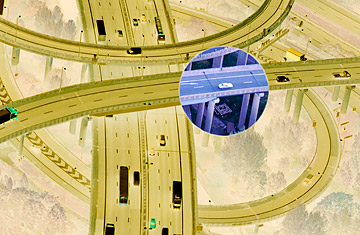
The Supreme Court ended its term Monday with a high-profile ruling that violent video games are protected by the First Amendment, but a bigger technology decision could be looming. The court agreed to hear a case next term about when the government can put GPS devices on people's cars — which could produce one of the court's biggest privacy rulings in years.
The GPS issue is important in its own right — the government can learn a lot about us if it tracks everywhere we go by car. But just as important, the case will give the Supreme Court a chance to weigh in about the steady erosion of privacy rights in the Internet age.
At the center of the case is a straightforward question: Do the police need a search warrant to put a GPS tracking device on a suspect's vehicle? The government says no, since it is just following a person's movements in public (albeit with some high-tech assistance). Civil libertarians insist that GPS tracking is so invasive that the Fourth Amendment requires it to have a warrant.
The courts that have considered the question so far have been sharply divided. The U.S. Court of Appeals for the District of Columbia Circuit has ruled that the police must get a warrant. Three other federal appeals courts, in Chicago, St. Louis and San Francisco, have come out the other way.
Key to the government's argument is the Supreme Court's 1983 ruling in United States v. Knotts, which held that the police did not need a warrant to install an electronic beeper in a container of chemicals being transported on a truck. The court reasoned that since the police could have just watched the truck drive along the public streets, the Fourth Amendment did not prevent them from "augmenting the sensory faculties bestowed on them at birth with such enhancement as science and technology afforded them."
Civil libertarians counter that there is a difference between a police officer visually monitoring someone's movements and installing a device that can minutely track their comings and goings, day in and day out, for months at a time. A GPS device can do something that, as a practical matter, the police could never do with their own "sensory faculties."
The ruling that the Supreme Court announced that it would review, United States v. Jones, explained the special dangers of GPS monitoring particularly well. In Jones, the U.S. Court of Appeals for the D.C. Circuit said that prolonged monitoring of a person's vehicle allowed the government to put together a "mosaic" of their activities. Monitoring someone with GPS for a month is far more invasive than a single instance of monitoring.
This mosaic theory is a new way of thinking about the Fourth Amendment in an age of pervasive tracking technology. When Knotts was decided, installing an electronic beeper was a relatively unusual law-enforcement technique. Now, GPS devices are far more common — and people carry around their own self-tracking technology in their cell phones.
If the Supreme Court endorses the mosaic theory, it could provide a powerful new way for citizens to push back against government monitoring. It would no longer be enough for law enforcement to say that they were only following a person's movements in public. The question would be, how long the government was observing and in what manner.
On the other hand, the justices could side with the other courts that have said that the government does not need a warrant to install a GPS device on a car. If it reverses the lower court's ruling in the Jones case, the Supreme Court could open the door to easier and more widespread spying by the government on ordinary citizens.
Constitutional privacy doctrines were largely developed before the Internet and the widespread adoption of GPS. New technologies make it much easier for the government to invade citizens' privacy. The Jones case, which could be argued as soon as this fall, will give the Supreme Court a chance to give Americans a privacy upgrade — or a serious downgrade.
Cohen, a former TIME writer and a former member of the New York Times editorial board, is a lawyer who teaches at Yale Law School. Case Study, his legal column for TIME.com, usually appears every Monday.
